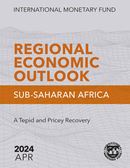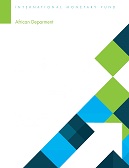This web page provides information in on the activities of the Office, views of the IMF staff, and the relations between Cameroon and the IMF. Additional information can be found on Cameroon and IMF country page, including official IMF reports and Executive Board documents in English and French that deal with Cameroon.
At a Glance
- Cameroon joined the Fund in July 10, 1963; Article VIII
- Total Quotas: SDR 276.00 Million (As of February 29, 2016)
- Loans outstanding: ESF RAC Loan SDR 65 Million
ECF Arrangements SDR 5.58 Million - Staff Report for the 2018 Article IV Consultation (Country Report No. 18/235, July 23, 2018)
Office Activities in Cameroon
-
Recent Economic Trends and Economic Outlook
Presentation
December 31, 2019
-
REO presentation given at the University of Dschang
December 1, 2019
-
Domestic Backlogs in Subsaharian Africa: amount, symptoms and solutions
Presentation
October 26, 2019
-
Cameroon: Economic Recovery in a Context of Great Incertainty
REO Presentation
May 2, 2019
-
Subsidizing Energy Consumption: Why it’s Wrong and What Can Be Done About it
Blog by Carlo Cottarelli, Director, FAD (IMF)
May 6, 2013
IMF's Work on Cameroon
-
July 22, 2024
Series:Country Report No. 2024/237
-
July 3, 2024
The Executive Board of the International Monetary Fund (IMF) completed today the sixth reviews under Cameroon’s Extended Credit Facility (ECF) and the Extended Fund Facility (EFF) arrangements.
-
Transcript of IMF Press Briefing
June 6, 2024
Good morning, everyone, both to those of you here with us in person and those joining us online, welcome to this IMF Press Briefing. I am Julie Kozack, Director of the Communications Department. As usual, this briefing is embargoed until 11:00 a.m. Eastern Time in the U.S. I will begin with some announcements and then we will turn to your questions in person, on Webex, or via the Press Center.
-
June 3, 2024
An International Monetary Fund (IMF) team, led by Ms. Cemile Sancak, Mission Chief for Cameroon, visited Yaoundé during April 25-May 8 and held virtual meetings during May 9-31 to discuss progress on reforms and the authorities’ policy priorities in the context of the sixth reviews of the four-year program supported by the Extended Credit Facility (ECF) and the Extended Fund Facility (EFF) arrangements, and the first review of the Resilience and Sustainability Facility (RSF). The ECF/EFF arrangements were approved by the IMF Executive Board for a total amount of SDR 483 million (US$ 689.5 million) in July 2021 (see press release 21/237)
-
May 31, 2024
Series:Country Report No. 2024/144
Regional Economic Outlook
April 19, 2024

After four turbulent years, the outlook for sub-Saharan Africa is gradually improving. Growth will rise from 3.4 percent in 2023 to 3.8 percent in 2024, with nearly two thirds of countries anticipating higher growth. Economic recovery is expected to continue beyond this year, with growth projections reaching 4.0 percent in 2025. Additionally, inflation has almost halved, public debt ratios have broadly stabilized, and several countries have recently issued Eurobonds, ending a two-year hiatus from international markets. However, not all is favorable and risks to the outlook remain tilted to the downside. The funding squeeze persists as the region’s governments continue to grapple with financing shortages, high borrowing costs, and impending debt repayments. Amid the challenges, sub-Saharan African countries will need additional support from the international community to develop a more inclusive, sustainable, and prosperous future.
Read the Report
Fraudulent Scam Emails Using the Name of the IMF
We would like to bring to the notice of the general public that several variants of financial scam letters purporting to be sanctioned by the International Monetary Fund (IMF) or authored by high ranking IMF officials are currently in circulation, and may appear on official letterhead containing the IMF logo. The scam letters instruct potential victims to contact the IMF for issuance of a “Certificate of International Capital Transfer” or other forms of approval, to enable them receives large sums of monies as beneficiaries. The contact e-mail information is always BOGUS and unsuspecting individuals are then requested to send their personal banking details which the scammers utilize for their fraudulent activities.For more information please see Fraudulent Scam Emails Using the Name of the IMF
Departmental Papers on Africa




